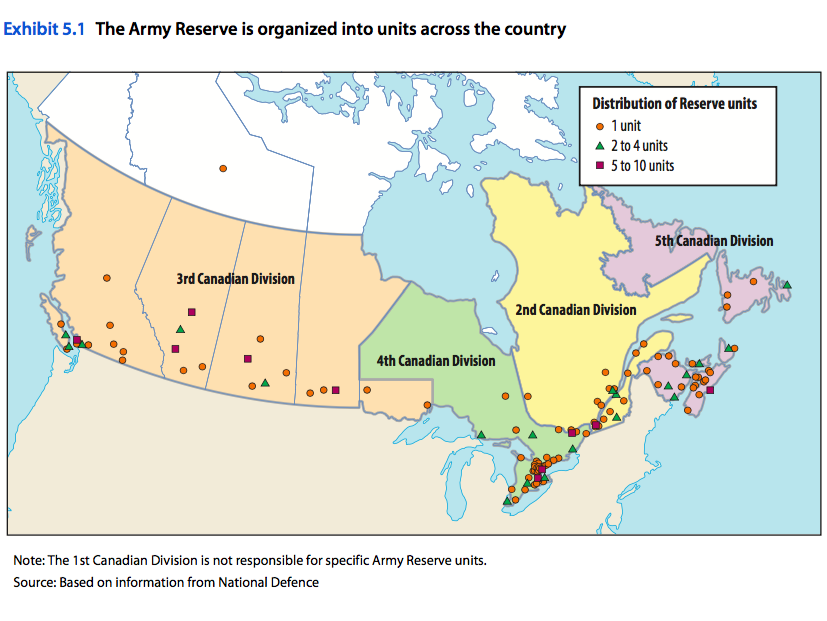Canada’s Army Reserves often lack the training and equipment they need, yet have given back millions in unspent funding, a new report says.
Auditor General Michael Ferguson released a report on Tuesday saying that funding for the reserves didn’t line up with what the reserves actually used, and that unspent money went instead to other parts of the military.

In the last fiscal year, the reserves had $13.5 million in unspent funding, the auditor general said. Of that amount, $8.2 million was used for "other purposes" in the army and $5.3 million was given back to the Department of National Defence.
“However, during visits to Army Reserve units, we were told that many needs were not being met for training,” the report said, including “equipment, ammunition, travel, and administrative support.”
Reservists are part-time soldiers who may be called upon to respond to emergencies in Canada, such as natural disasters, or to participate in international missions once regular force members are done their first rotations. There are about 20,000 Canadian reservists.

The auditor general said the Canadian Army may have misrepresented to Parliament how much it actually spends on the Army Reserves.
The Department of National Defence said it spent $1.2 billion training and operating the reserves in 2013-2014. Yet $166 million of that was attributed to the reserves for operating army bases. According to the auditor general, that figure was calculated by taking the total cost of the bases and dividing it by the number of regular force members and reservists. The army doesn't actually know how much the reserves use bases.
“In our opinion, the $166 million estimate is not well supported,” the auditor general said, “and may result in providing incorrect information to Parliament by overstating the reported expenses of the Primary Reserve.”
The auditor general said the reserves calculate their funding based on each soldier participating in unit work for 37.5 days each year. But the auditor general’s office said it found an internal army report from 2013 that said the reserves actually use 10 days less than that.
“This analysis was not endorsed, and no action has been taken to either acknowledge or address this discrepancy,” the auditor general said.
Moreover, the auditor general found that last year about half of reserve soldiers had only participated in 25 days of army-related activities.
“We were told that units used some of these unspent funds to increase spending on the activity of other soldiers or other unit activities,” the auditor general said. “This analysis questioned whether the present method of funding Army Reserve units was appropriate and accurate.”
The army said it would comply with the auditor general’s recommendations.
The auditor general also found that the reserves did not have the guidance needed to train soldiers to perform certain key tasks — such as escorting convoys, performing surveillance, and protecting forces — on international missions.
For operations at home, training guidance was clearer, the auditor general found — but reserves often didn’t have the equipment they needed.
The auditor general said reservists who fought floods in Alberta and Manitoba in recent years reported, on many occasions, “key equipment lacking, such as reconnaissance vehicles, command posts, and communications equipment.”
The army reserves are also understaffed, the auditor general said, because the army has trouble recruiting and keeping reservists.

The auditor general found that between the last two fiscal years, "the number of Army Reserve soldiers had been declining at a rate of about five percent, or about 1,000 soldiers per year."
UPDATE
L-Gen Marquis Hainse, the commander of the army, released a statement saying the army is "putting measures in place" to make sure reservists are better trained.
He also said the army is working on a plan to deal with equipment shortages.
As for the funding discrepancies, Hainse said the army "takes the stewardship of public resources seriously" and is revising the funding model for the reserves.
"The recommendations of the Auditor General will serve to inform this review and ensure the funding model is more transparent and accountable to the Government of Canada," Hainse said.
